NRNP 6645-1 Week 11 Final Exam
- $55.00
- Question: The advanced practice psychiatric nurse encourages a patient with gambling addiction to develop a relapse prevention plan. Which of the following is true about a relapse prevention plan?
- Question: Which of the following is consistent with the psychotherapeutic approach used by existential psychotherapists?
- Question: According to Dearing, Stuewig, and Tangney (2005), understanding the difference between guilt and shame and its impact on an individual’s motivation is critical to hope and the recovery process. Which of the following is true regarding guilt and shame?
- Question: Which of the following is not consistent with what is known about relapse?
- Question: The advanced practice psychiatric nurse proficient in Interpersonal Psychotherapy (IPT) is working with an older adult who does not realize she has depression. Which of the following is true?
- Question: The patient in Dialectical Behavior Therapy (DBT) complains the skills being taught in DBT don’t work, struggles with keeping diary cards, and doing assigned homework. This is consistent with which stage of treatment within the DBT model?
- Question: The existential concept of an openness, readiness, and flexibility to grow and change, which necessitates a capacity to choose alternatives, and shape one’s own destiny as authors of creating their own world is which of the following?
- Question: Which of the following is not consistent with a family-centered approach in child therapy?
- Question: The Gestalt therapist notices the patient is fidgeting with fingers, legs are shaking and asks the patient “What are you experiencing right now in your body?” This is a type of creative experimentation known as which of the following?
- Question: The advanced practice psychiatric nurse is working with a group of patients in an outpatient substance abuse treatment program. One patient comes to the advanced practice psychiatric nurse after the group session and asks if the advanced practice psychiatric nurse would meet at a nearby Starbucks to clarify a couple of questions that came up at the end of the session and fears relapse. Which of the following would be consistent with the traditional therapeutic frame?
- Question: Which of the following statements would not be consistent with the humanistic-existential concept of “holism”?
- Question: Which of the following statements would not be consistent with the humanistic-existential concept of “holism”?
- Question: Stigma of mental illness in the elderly:
- Question: The advanced practice psychiatric nurse encourages the older adult to recall long forgotten experiences, events which are memorable to the person. This is known as
- Question: The advanced practice psychiatric nurse is working with a patient who states she believes her boss hates her. After some discussion, it is clear the patient has strong negative feelings towards her boss. The advanced practice psychiatric nurse working within a Gestalt framework, recognizes this as an interruption consistent with which of the following?
- Question: The most effective treatment for SUD with or without co-morbid psychiatric disorders is:
- Question: Positive substance use disorder treatment out-comes unique to women can be strengthened by which of the following.
- Question: A specific type of CBT therapies aimed to reduce distress as a person experiences sensation with danger is known as which of the following?
- Question: Which of the following are “Help Now!” skills? Select all that apply.
- Question: Practice guidelines for complex trauma and dissociative identity disorder caution that which of the following may limit one’s ability to heal.
- Question: In following the rules for the Dialectical Behavior Therapy (DBT) therapist, the therapist would not do which of the following?
- Question: Research suggests that psychodynamic therapeutic approaches are effective for some children, particularly those with which of the following disorders?
- Question: When using a Dialectical Behavior Therapy (DBT) approach with a patient with Borderline Personality Disorder the advanced practice psychiatric nurse knows which of the following is inconsistent DBT assumptions about patients?
- Question: The patient in Dialectical Behavior Therapy with a history of self-harming through cutting, has shown progress in effectively using skills to manage urges integrating skills to manage emotions and behaviors with increased awareness of self. The advanced practice psychiatric nurse recognizes the patient is ready for which of the following?
- Question: Strategies for terminating a therapy relationship with an older adult includes:
- Question: The person-centered therapist is expected to exhibit which of the following characteristics?
- Question: The patient demonstrates the ability to regulate his emotions in such a way he can think through them. The advanced practice psychiatric nurse using a Dialectical Behavior Therapy approach recognizes this ability is consistent with which stage of treatment?
- Question: Which of the following is not consistent with the Principles of Effective Treatment for Addiction according to the NIH?
- Question: The advanced practice psychiatric nurse using a Dialectical Behavior Therapy approach with a patient with Borderline Personality Disorder explains the four essential elements which includes all but which of the following?
- Question: Evidence supports which of the following statements about women and addictions treatment?
- Question: Which of the following statements would be consistent with Trauma-Informed Care when treating patients with comorbid PTSD and Substance Use Disorder?
- Question: The advanced practice psychiatric nurse using Dialectical Behavior Therapy with a patient with borderline personality disorder uses persuasive dialogue to do which of the following?
- Question: A patient whose husband had recently died suddenly expresses remorse regarding an argument they had shortly before his death. The Gestalt Therapist would likely use which of the following techniques to complete unfinished business?
- Question: Evidence supports use of Dialectical Behavior Therapy patients with which of the following diagnoses?
- Question: Problems in the preschool child’s self-regulation has been tied to subsequent issues with which of the following?
- Question: Which of the following would not be a first-line intervention for an individual with PTSD?
- Question: The advanced practice psychiatric nurse working with children/adolescents in psychotherapy is aware of which of the following?
- Question: Using a psychodynamic psychotherapy stage oriented model for the treatment of trauma, the advanced practice psychiatric nurse would do which of the following in Stage 1?
- Question: When doing psychotherapy with older adult’s accommodations which target cognitive symptoms and functional deficits include:
- Question: Humanistic-existential therapies focus more on process and this process is best described by which of the following?
- Question: Dysfunctional processes, developed early in life that people employ in an attempt to meet their Needs, are referred to by the Gestalt therapist as which of the following?
- Question: According to the Trauma Resiliency Model which of the following occurs?
- Question: Which of the following is not consistent with what is currently known about debriefing?
- Question: Stress inoculation therapy (SIT) can be helpful for patients with phobic avoidance due to trauma. The advanced practice psychiatric nurse using SIT would do which of the following?
- Question: The person-centered therapist who is genuine and authentic during the therapy session is exhibiting which psychologicalcondition?
- Question: The patient in Dialectical Behavior Therapy (DBT) expresses frustration that the skills taught don’t work, the process is taking too long, and is struggling to complete homework. The advanced practice psychiatric nurse using a DBT model would do which of the following?
- Question: The therapeutic frame supports the clinician in which of the following ways? Select all that apply.
- Question: One of the problems when meeting with children individually is that it can create secrets. Which of the following responses would the advanced practice psychiatric nurse do to address this concern?
- Question: The therapeutic frame supports the clinician in which of the following ways? Select all that
- Question: The advanced practice psychiatric nurse is working with a patient with who is chronically suicidal. The advanced practice psychiatric nurse using a Dialectical Behavior Therapy (DBT) approach realizes which of the following?
- Question: The concept of resiliency in child therapies is in direct contrast to which traditional approach for treating children?
- Question: The concept of resiliency in child therapies is in direct contrast to which traditional approach for treating children?
- Question: Which of the following is not consistent with the Psychoanalyst's perspective when treating and individual with a personality disorder?
- Question: Which of the following statements would not be consistent with the humanistic-existential concept of "holism"?
- Question: Which of the following is true about dream work from a Gestalt perspective?
- Question: When the advanced practice psychiatric nurse builds a formulation when working with a child in therapy the advanced practice psychiatric nurse is doing which of the following?
- Question: In providing psychoeducation to patient's in recovery, the advanced practice psychiatric nurse would not include which of the following?
- Question: Which best describes gerotranscendence?
- Question: The advanced practice psychiatric nurse is working with a group of patients in an outpatient substance abuse treatment program. One patient comes to the advanced practice psychiatric nurse after the group session and asks if the advanced practice psychiatric nurse would meet at a nearby Starbucks to clarify a couple of questions that came up at the end of the session and fears relapse. Which of the following would be consistent with the traditional therapeutic frame?
- Question: The situation in which increasing amounts of a substance is needed to achieve the same desired effect is known as which of the following?
- Question: Which of the following describes the basic neurobiological pathways of the reward system in the brain? A . Projections from the ventral tegmental area, through the median forebrain and terminate in the nucleus accumbens where there is a proliferation of dopamineneurons.
- Question: Evidence supports use of Dialectical Behavior Therapy patients with which of thefollowing diagnoses?
- Question: The existential concept of an openness, readiness, and flexibility to grow and change,which necessitates a capacity to choose alternatives, and shape one's own destiny as authors of creating their own world is which of the following?
- Question: Using a psychodynamic psychotherapy stage oriented model for the treatment of trauma, the advanced practice psychiatric nurse would do which of the following in Stage 1?
- Question: The advanced practice psychiatric nurse is working with a patient who states she believes her boss hates After some discussion, it is clear the patient has strong negative feelings towards her boss. The advanced practice psychiatric nurse working within a Gestaltframework, recognizes this as an interruption consistent with which of the following?
- Question: The patient in Dialectical Behavior Therapy (DBT) expresses frustration that the skills taught don't work, the process is taking too long, and is struggling to complete homework.The advanced practice psychiatric nurse using a DBT model would do which of the following?
- Question: An organized, consistent set of perceptions about the self, continually influenced by experience and its interpretation which includes self-worth, self-image and ideal self, is which key concept of person-centered therapy?
- Question: The advanced practice psychiatric nurse using a Dialectical Behavior Therapy approach with a patient with Borderline Personality Disorder explains the four essential elements which includes all but which of the following?
- Question: The therapeutic frame supports the clinician in which of the following ways? Select all that apply.
- Question: The advanced practice psychiatric nurse is working with a patient with who is chronically suicidal. The advanced practice psychiatric nurse using a Dialectical Behavior Therapy (DBT) approach realizes which of the following?
- Question: The concept of resiliency in child therapies is in direct contrast to which traditional approach for treating children?
- Question: Stigma of mental illness in the elderly:
- Question: Which of the following is not consistent with the Psychoanalyst's perspective when treating and individual with a personality disorder?
- Question: Which of the following statements would not be consistent with the humanistic-existential concept of "holism"?
- Question: Which of the following is true about dream work from a Gestalt perspective?
- Question: When the advanced practice psychiatric nurse builds a formulation when working with a child in therapy the advanced practice psychiatric nurse is doing which of the following?
- Question: In providing psychoeducation to patient's in recovery, the advanced practice psychiatric nurse would not include which of the following?
- Question: Which best describes gerotranscendence? A Erik Erikson's ninth stage of development.
- Question: The advanced practice psychiatric nurse is working with a group of patients in an outpatient substance abuse treatment program. One patient comes to the advanced practice psychiatric nurse after the group session and asks if the advanced practice psychiatric nurse would meet at a nearby Starbucks to clarify a couple of questions that came up at the end of the session and fears relapse. Which of the following would be consistent with the traditional therapeutic frame?
- Question: The situation in which increasing amounts of a substance is needed to achieve the same desired effect is known as which of the following?
- Question: Which of the following describes the basic neurobiological pathways of the reward system in the brain?
- Question: Evidence supports use of Dialectical Behavior Therapy patients with which of the following diagnoses?
- Question: The existential concept of an openness, readiness, and flexibility to grow and change,which necessitates a capacity to choose alternatives, and shape one's own destiny as authors of creating their own world is which of the following?
- Question: Using a psychodynamic psychotherapy stage oriented model for the treatment of trauma, the advanced practice psychiatric nurse would do which of the following in Stage 1?
- Question: The advanced practice psychiatric nurse is working with a patient who states she believes her boss hates After some discussion, it is clear the patient has strong negative feelings towards her boss. The advanced practice psychiatric nurse working within a Gestalt framework, recognizes this as an interruption consistent with which of the following?
- Question: The patient in Dialectical Behavior Therapy (DBT) expresses frustration that the skills taught don't work, the process is taking too long, and is struggling to complete homework. The advanced practice psychiatric nurse using a DBT model would do which of the following?
- Question: An organized, consistent set of perceptions about the self, continually influenced by experience and its interpretation which includes self-worth, self-image and ideal self, is which key concept of person-centered therapy?
- Question: The advanced practice psychiatric nurse using a Dialectical Behavior Therapy approach with a patient with Borderline Personality Disorder explains the four essential elements which includes all but which of the following?
- Question: Which of the following is not consistent with recommendations for teaching Trauma Resiliency Model (TRM)skills?
- Question: The advanced practice psychiatric nurse realizes a basic assumption of Dialectical Behavior Therapy (DBT) is that therapists treating the difficult patient need support. This support includes which of the following?
- Question: In working with an older adult patient in the termination phase the advanced practice psychiatric nurse suggests it may be helpful to teach family members ways to support the patient and prevent relapse. This demonstrates which of the following?
- Question: Which of the following is true about communication with children and adolescents?
- Question: Practice guidelines for complex trauma and dissociative identity disorder caution that which of the following may limit one's ability to heal.
- Question: Which of the following trends life trends suggests advanced practice psychiatric nurse be prepared to provide mental health and illness treatment in a variety of community and non- traditional settings.
- Question: Dialectical Behavior Therapists realize which of the following:
- Research support that children with serious emotional disorders (SED) are likely to have which of the following?
- Question: Which of the following is a biologically based psychotherapy methodology used to treat patients who have experienced trauma?
- Question: Which of the following is not consistent with a family-centered approach in child therapy?
- Question: In working with children between the ages of about 7-11 years of age, the advanced practice psychiatric nurse would include activities consistent with which of stage of Piaget's stages of cognitive development?
- Question: The advanced practice psychiatric nurse working with a patient with borderline personality disorder is aware that which of the following attachment styles has been highly correlated with Borderline personality disorder?
- Question: Which of the following medications may be recommended for patients with insomnia due to PTSD?
Additional Practice Question/Solutions
- Question: According to the MacArthur Study of Successful Aging protective factors on mental and cognitive functioning and successful aging include:
- Question: The advanced practice psychiatric nurse is working with the patient on maintaining treatment outcomes and developing a guide for surviving difficult times. These strategies are consistent with which phase in the CBTprocess?
- Question: Strategies for terminating a therapy relationship with an older adult includes:
- Question: The advanced practice psychiatric nurse using Dialectical Behavior Therapy with a patient with borderline personality disorder uses persuasive dialogue to do which of the following?
- Question: Which of the following would not be a first-line intervention for an individual with PTSD?
- Question: Emotion-Focused therapy integrates which of the following?
- Stress inoculation therapy (SIT) can be helpful for patients with phobic avoidance due to trauma. The advanced practice psychiatric nurse using SIT would do which of the following?
- The purpose of Mindfulness-Based Stress Reduction in the older adult is
- The stabilization skills and concepts that form the foundation of Trauma Resiliency Model stand alone as a model in and of itself called CRM. CRM stands for which of the following?
- Which of the following is not an underlying assumption that differentiates child therapies from adult psychotherapy?
- Question: Which of the following is consistent with a Common Elements approach?
- Question: Functional status refers to
- Question: Which of the following is not true about self-regulation as it applies to therapy with children?
- Question: Which of the following is not consistent with Eye Movement Desensitization and Reprocessing (EMDR) literature in treating PTSD?
- Question: Which of the following is true about Complementary and Alternative Medicine(CAM) Therapies and Older Adults?
- Question: The advanced practice psychiatric nurse using a Dialectical Behavior Therapy approach with a patient with Borderline Personality Disorder explains the four essential elements which includes all but which of the following?
- Question: The primary source for constructive change in a humanistic-existential approach is which of the follow:
- Question: The advanced practice psychiatric nurse working with children/adolescents in psychotherapy is aware of which of the following?
- Question: When using a Dialectical Behavior Therapy (DBT) approach with a patient with Borderline Personality Disorder the advanced practice psychiatric nurse knows which of the following is inconsistent DBT assumptions about patients?
- Question: A natural process whereby the individual is continually disturbed by the emergence of a need, strives to restore equilibrium by constantly reorganizing and adapting to changing circumstances in recognized by the Gestalt therapist as which of the following?
- Question: Which of the following does the advanced practice psychiatric nurse need to consider when treating older adults with Substance Use Disorders?
- In following the rules for the Dialectical Behavior Therapy (DBT) therapist, the therapist would not do which of the following?
- Question: According to Dearing, Stuewig, and Tangney (2005), understanding the difference between guilt and shame and its impact on an individual's motivation is critical to hope and the recovery process. Which of the following is true regarding guilt and shame?
- Question: Research suggests that psychodynamic therapeutic approaches are effective for some children, particularly those with which of the following disorders?
- Question: A Trauma Resiliency Model therapist encourages the patient to describe the "felt sense" of internal or external body sensations associated with resilience, stress, and release. This is known as which of the following Trauma Resiliency Model skills?
- Question: During your second CBT session with an older adult the patient expresses to you comfort with the CBT model and begins to ask questions about how the therapy works. This indicates which of the following?
- Question: Dysfunctional processes, developed early in life that people employ in an attempt to meet their Needs, are referred to by the Gestalt therapist as which of the following?
- Question: When doing psychotherapy with older adult's accommodations which target cognitive symptoms and functional deficits include:
- Question: When doing psychotherapy with older adult's accommodations which target cognitive symptoms and functional deficits include:
- Question: Addiction is now recognized as which of the following?
- Question: The advanced practice psychiatric nurse is using a Dialectical Behavior Therapy (DBT) approach with a patient who has experienced trauma. In which stage of the DBT model would the advanced practice psychiatric nurse begin exposure therapy?
- Question: A specific type of CBT therapies aimed to reduce distress as a person experiences sensation with danger is known as which of the following?
- Question: Which of the following statements would be consistent with Trauma-Informed Care when treating patients with comorbid PTSD and Substance Use Disorder?
- Question: Which of the following activities is not consistent with the first phase of the eight-phase protocol for Eye Movement Desensitization and Reprocessing (EMDR) when working with a patient who has PTSD?
- Question: Evidence supports use of Dialectical Behavior Therapy patients with which of the following diagnoses?
- Question: Which therapy approach has been shown to be effective in reducing depressive symptoms and suicidality in older adult with co-existing personality disorders?
- Question: Which of the following is a philosophical approach to psychotherapy which deals with universal themes oflife?
- Question: The advanced practice psychiatric nurse using Dialectical Behavior Therapy with a patient diagnosed with a personality disorder explains that for success in treatment, the patient must attend the individual and group skills sessions consistently. It is explained to the patient that if four sessions are missed consecutively the treatment will end. Which of the following is true about this rule?
- Question: Which of the following is consistent with Trauma Resiliency Model (TRM) therapy?
- Question: The advanced practice psychiatric nurse working with the older adult cohort recognizes:
- Question: Evidence-based therapeutic modalities for treating older adults with anxiety include which of the following:
- Question: The patient in Dialectical Behavior Therapy with a history of self-harming through cutting, has shown progress in effectively using skills to manage urges integrating skills to manage emotions and behaviors with increased awareness of self. The advanced practice psychiatric nurse recognizes the patient is ready for which of the following?
- Question: Which of the following screening tools is geared toward screening pregnant women for alcohol and drug abuse
- Question: Which of the following statements is consistent with a humanistic-existential approach when the patient starts talking about past event?
- Question: Recovery, according to behavioral health leaders, is considered a lifelong process that encompasses which four major dimensions:
- Question: The loss of control over the intense urge to take a drug even at the expense of adverse consequences is known as which of the following?
- Question: The situation in which increasing amounts of a substance is needed to achieve the same desired effect is known as which of the following?
- Question: In using trauma-focused cognitive behavioral therapy with a child exposed to domestic violence the advanced practice psychiatric nurse realizes the first component of this structured approach includes which of the following?
- Question: The existential concept of an openness, readiness, and flexibility to grow and change, which necessitates a capacity to choose alternatives, and shape one's own destiny as authors of creating their own world is which of the following?
- Question: The advanced practice psychiatric nurse using supportive psychotherapy with a patient with a preoccupied attachment style would use which of the following interventions?
- Question: In working with an older female patient, the advanced practice psychiatric nurse notices the patient seems to respond superficially reminding the advanced practice psychiatric nurse of her own mother and finds herself looking forward to their sessions, which recently have been going longer than scheduled. The advanced practice psychiatric nurse recognizes this as
- Problems in the preschool child's self-regulation has been tied to subsequent issues with which of the following?
- The Dialectical Behavior Therapy (DBT) therapist meets with the client, negotiates the goals of therapy, and arrives at a commitment to the treatment. Assumptions and principles of the DBT model are explained. This is consistent with which stage of treatment within the DBT model?
- Question: Evidence supports which of the following statements about women and addictions treatment?
- Question: The Gestalt therapist notices the patient is fidgeting with fingers, legs are shaking and asks the patient "What are you experiencing right now in your body?" This is a type of creative experimentation known as which of the following?
- Question: The advanced practice psychiatric nurse realizes which of the following with respect to individuals with personality disorders of traits?
- Question: McGovern et al (2014) have found which of the following therapeutic approaches helpful In working with post-stroke patients experiencing depression?
- Question: The Dialectical Behavior Therapy (DBT) therapist addresses life-threatening behaviors and therapy-interfering behaviors with the patient. This is consistent with which stage of treatment within the DBT model?
- Question: In child psychotherapy consideration of systems that promote a child's ongoing development include which of the following?
- Question: The advanced practice psychiatric nurse encourages the older adult to recall long forgotten experiences, events which are memorable to the person. This is known as
- Question: The patient in Dialectical Behavior Therapy (DBT) is focusing of self-efficacy, interdependence and self-dependence. At times, the patient seems bored with therapy, and reports dealing quickly and effectively with self-harming urges that have resurfaced. The advanced practice psychiatric nurse using the DBT model would do which of the following?
- Question: Which of the following is not consistent with a family-centered approach in working with children/adolescents?
- Question: The Gestalt Therapist working with a patient notices that every time a sensitive issue come up the patient will change the topic and tell a joke. The therapist recognizes this interruption as which of the following?
- Question: The patient demonstrates the ability to regulate his emotions in such a way he can think through them. The advanced practice psychiatric nurse using a Dialectical Behavior Therapy approach recognizes this ability is consistent with which stage of treatment?
- Question: In working with a patient with borderline personality disorder, the Dialectical Behavior Therapy (DBT) therapist emphasizes suicidal and self-harming behaviors are problems to be solved and are the highest priority for treatment. Which of the following would be inconsistent with DBT therapy?
- Question: Which of the following is not consistent with the Dialectical Behavior Therapy approach to boundary maintenance?
- Question: Which of the following are psychotherapeutic techniques used in person centered psychotherapy?
- Question: A patient whose husband had recently died suddenly expresses remorse regarding an argument they had shortly before his death. The Gestalt Therapist would likely use which of the following techniques to complete unfinished business?
- Question: According to a Gestalt framework, to uncritically accept others' beliefs and standards without discriminating and assimilating what belongs to self or not, is a dysfunctional process known as which of the following:
- Question: Which of the following is not consistent with the Cognitive Behavioral therapist perspective when treating and individual with a personality disorder?
- Question: The patient in Dialectical Behavior Therapy (DBT) expresses frustration that the skill taught don't work, the process is taking too long, and is struggling to complete homework. The advanced practice psychiatric nurse using a DBT model would do which of the following?
- Question: The advanced practice psychiatric nurse notices in working with a patient with a dissociative disorder that the person appears to be doing worse after significant gains are made. The advanced practice psychiatric nurse explains the reason for this is likely which of the following?
- Question: Which of the following is consistent with the psychotherapeutic approach used by existential psychotherapists?
- Question: This theoretically and clinically complex psychotherapeutic approach which recognizes the unity of humans as integrated wholes, not divided into parts, taken out of context, or generalized, is known as which of the following?
-600x800.png)
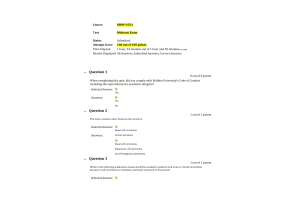
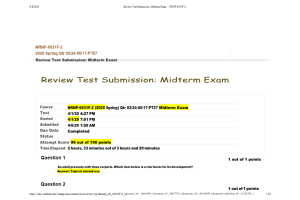
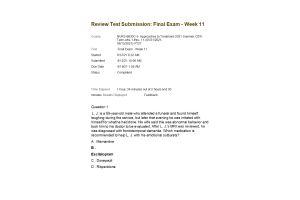
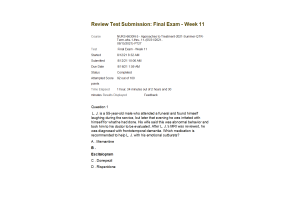
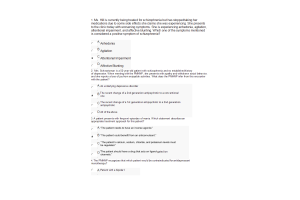
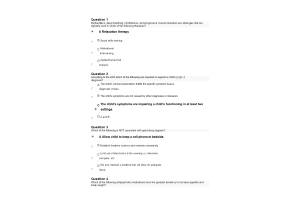
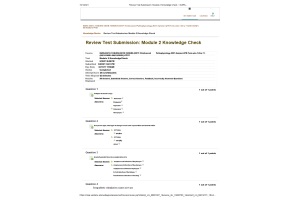

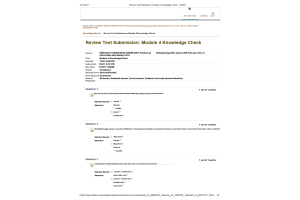
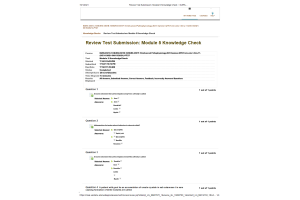
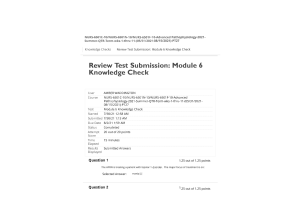
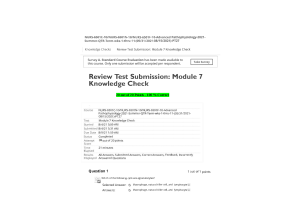
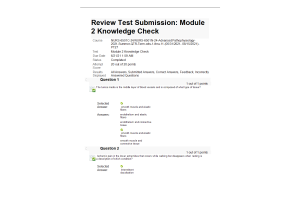
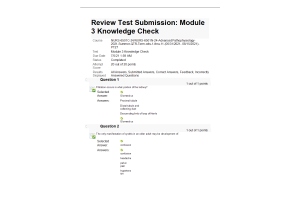
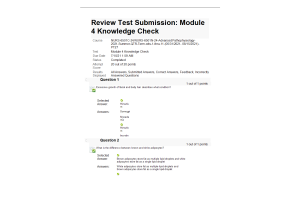
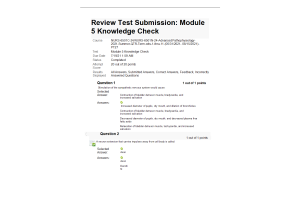
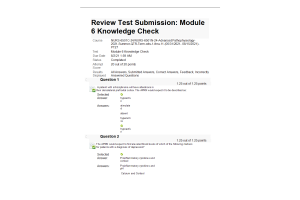
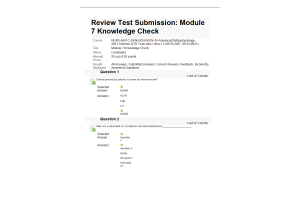
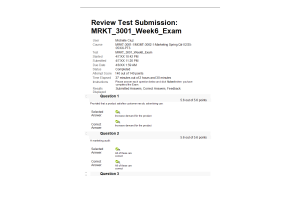
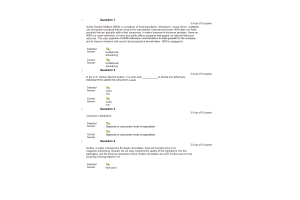
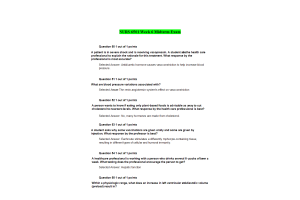
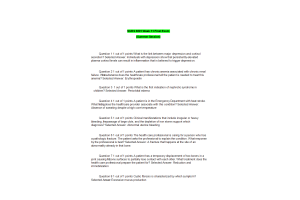
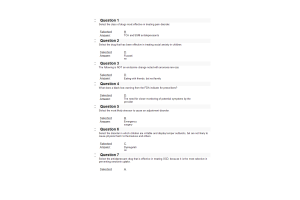
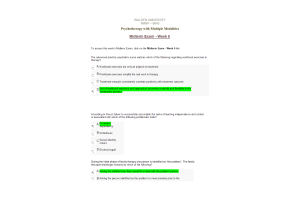
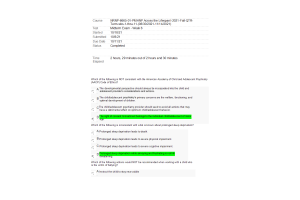
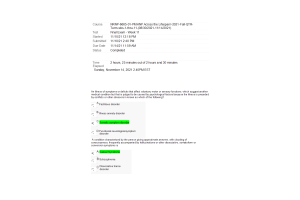
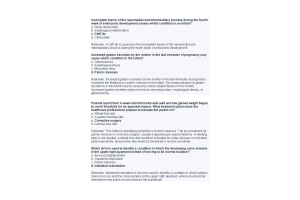
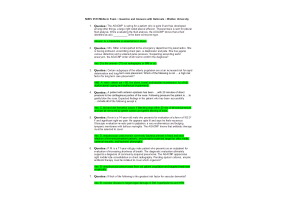
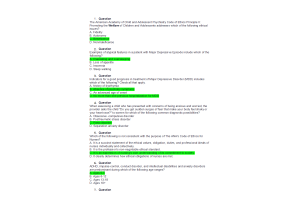
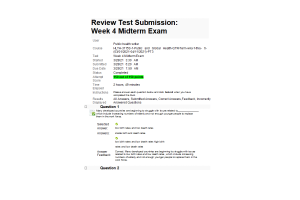
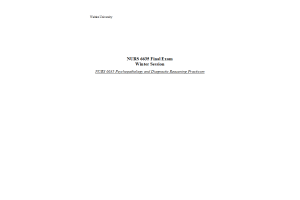
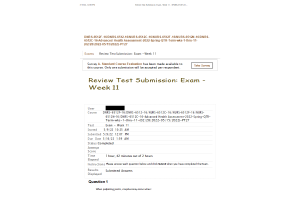
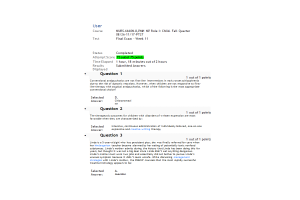
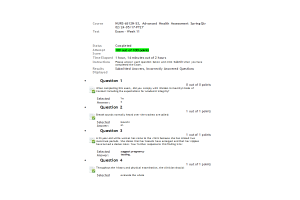
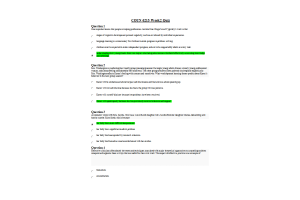
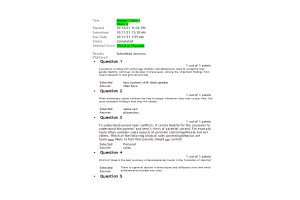
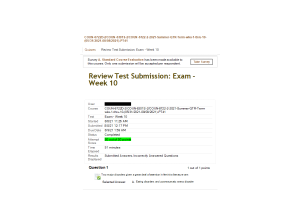
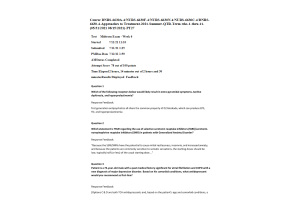
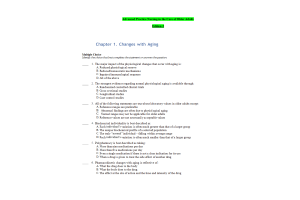
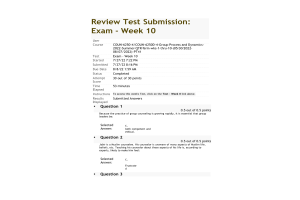
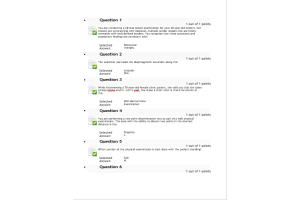
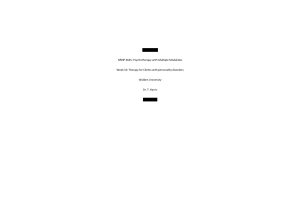
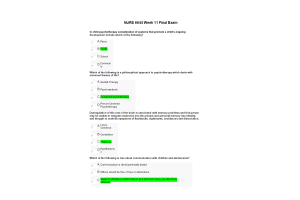



-300x200.png)